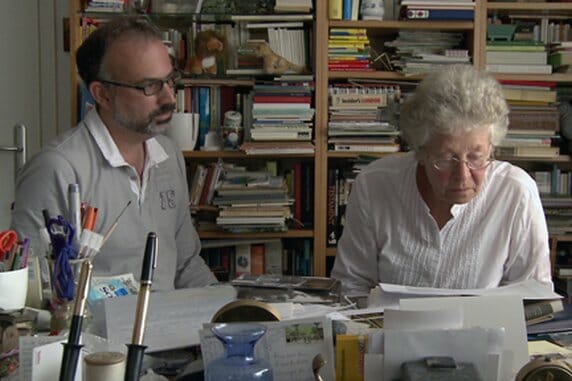
When Arnon Goldfinger’s grandmother Gerda passes away, he’s left with the task of cleaning out her flat in Tel Aviv. A Jewish couple who moved from Berlin on the eve of the World War II for obvious reasons, Gerda Tuchler and her husband, Kurt, filled their apartment with enough German novels, furniture and knick-knacks to disorient any houseguest. It was a move of physical necessity, so they brought their physical environment with them and created a European oasis in their new locale. But as Goldfinger begins to go through the stashes of photographs, letters and assorted paper stowaways, he finds something even more disorienting: his grandparents’ closest friends, the von Mildensteins, contributed to the very circumstances from which the Tuchlers fled.
While other family members play dress up in old furs and scoff at the antiquity of bookshelves lined with Nietzsche, Goldfinger patiently turns his eyes toward old newspapers and soon finds himself on a paper trail into a family history he didn’t know he had. An old clipping from a Nazi publication with the headline “A Nazi Goes to Palestine” stars none other than Leopold von Mildenstein, which gets Goldfinger wondering who his grandparents really were and why Nazis would be traveling to visit them after the war.
Suddenly, a the cleaning out of an apartment begins to unfold like Jacob’s Ladder into the exposure of a family’s past. Playing detective, Goldfinger hunts down the journalists of his newspaper clipping, pores over official documents filed away in German government buildings and even pays a visit to von Mildenstein’s daughter, Edda. It’s as if he no longer knows exactly who he is until he can find the answer to his question: Why would his Jewish grandparents be such close friends with Nazis?
Question aside, one of the most interesting dynamics in the film is between Goldfinger and his mom, who joins him on his journey as an ever upbeat sidekick. Passively soaking in information that she never knew about her own parents, she’s a living example of the generational phenomenon among Holocaust descendants. When it comes to learning about the past, second generation descendants are known to keep their mouths shut, feeling too close in time to the actual event to summon memories without causing pain to their parents, the first generation. The third generation, however, wants to know all about what happened to their family, and Goldfinger is a prime example. In the inevitably tender visit with Edda, Goldfinger comes on a bit strong and nearly steps on a toe or five. His mom, however, easily finds the common ground with Edda in how they both related to their parents—a policy of “don’t ask, maybe they’ll tell.” The subject matter is less of an obstacle than the different way in which it’s handled, generationally.
Like many who take the time to research who and where they come from, Goldfinger finds that not everything is as linear as branches on the family tree, and the answers that he’s looking for aren’t always there. The film feels slow in parts where he tries out different trails only to find that they lead to similar places, but each new piece of information sparks a tingle of anticipation, not dissimilar to a good mystery novel. Watching Goldfinger’s curiosity be met with different answers to the same questions while his mother absorbs this new side of her own parents proves a fascinating study in family history. Sometimes, the truth has been left in the past, and all that can be done is try to piece together the clues left behind.
Director: Arnon Goldfinger
Writer: Arnon Goldfinger
Starring: n/a
Release Date: Oct. 19, 2012